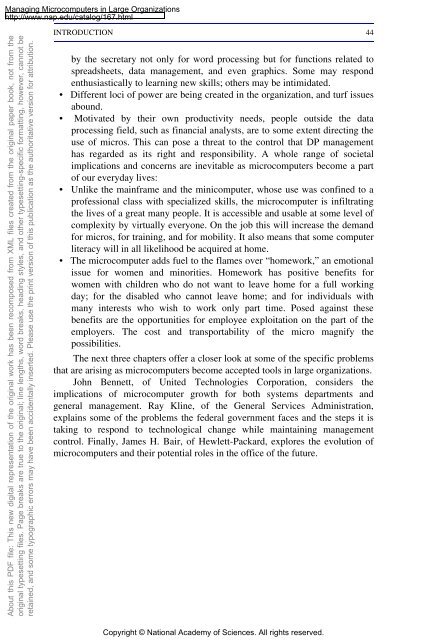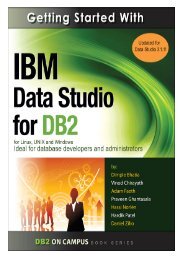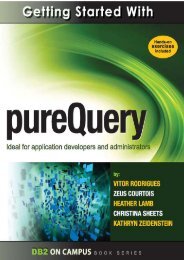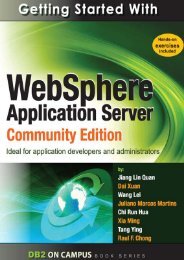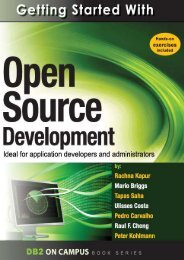Managing Computers in Large Organizations
You also want an ePaper? Increase the reach of your titles
YUMPU automatically turns print PDFs into web optimized ePapers that Google loves.
<strong>Manag<strong>in</strong>g</strong> Microcomputers <strong>in</strong> <strong>Large</strong> <strong>Organizations</strong><br />
http://www.nap.edu/catalog/167.html<br />
About this PDF file: This new digital representation of the orig<strong>in</strong>al work has been recomposed from XML files created from the orig<strong>in</strong>al paper book, not from the<br />
orig<strong>in</strong>al typesett<strong>in</strong>g files. Page breaks are true to the orig<strong>in</strong>al; l<strong>in</strong>e lengths, word breaks, head<strong>in</strong>g styles, and other typesett<strong>in</strong>g-specific formatt<strong>in</strong>g, however, cannot be<br />
reta<strong>in</strong>ed, and some typographic errors may have been accidentally <strong>in</strong>serted. Please use the pr<strong>in</strong>t version of this publication as the authoritative version for attribution.<br />
INTRODUCTION 44<br />
by the secretary not only for word process<strong>in</strong>g but for functions related to<br />
spreadsheets, data management, and even graphics. Some may respond<br />
enthusiastically to learn<strong>in</strong>g new skills; others may be <strong>in</strong>timidated.<br />
• Different loci of power are be<strong>in</strong>g created <strong>in</strong> the organization, and turf issues<br />
abound.<br />
• Motivated by their own productivity needs, people outside the data<br />
process<strong>in</strong>g field, such as f<strong>in</strong>ancial analysts, are to some extent direct<strong>in</strong>g the<br />
use of micros. This can pose a threat to the control that DP management<br />
has regarded as its right and responsibility. A whole range of societal<br />
implications and concerns are <strong>in</strong>evitable as microcomputers become a part<br />
of our everyday lives:<br />
• Unlike the ma<strong>in</strong>frame and the m<strong>in</strong>icomputer, whose use was conf<strong>in</strong>ed to a<br />
professional class with specialized skills, the microcomputer is <strong>in</strong>filtrat<strong>in</strong>g<br />
the lives of a great many people. It is accessible and usable at some level of<br />
complexity by virtually everyone. On the job this will <strong>in</strong>crease the demand<br />
for micros, for tra<strong>in</strong><strong>in</strong>g, and for mobility. It also means that some computer<br />
literacy will <strong>in</strong> all likelihood be acquired at home.<br />
• The microcomputer adds fuel to the flames over “homework,” an emotional<br />
issue for women and m<strong>in</strong>orities. Homework has positive benefits for<br />
women with children who do not want to leave home for a full work<strong>in</strong>g<br />
day; for the disabled who cannot leave home; and for <strong>in</strong>dividuals with<br />
many <strong>in</strong>terests who wish to work only part time. Posed aga<strong>in</strong>st these<br />
benefits are the opportunities for employee exploitation on the part of the<br />
employers. The cost and transportability of the micro magnify the<br />
possibilities.<br />
The next three chapters offer a closer look at some of the specific problems<br />
that are aris<strong>in</strong>g as microcomputers become accepted tools <strong>in</strong> large organizations.<br />
John Bennett, of United Technologies Corporation, considers the<br />
implications of microcomputer growth for both systems departments and<br />
general management. Ray Kl<strong>in</strong>e, of the General Services Adm<strong>in</strong>istration,<br />
expla<strong>in</strong>s some of the problems the federal government faces and the steps it is<br />
tak<strong>in</strong>g to respond to technological change while ma<strong>in</strong>ta<strong>in</strong><strong>in</strong>g management<br />
control. F<strong>in</strong>ally, James H. Bair, of Hewlett-Packard, explores the evolution of<br />
microcomputers and their potential roles <strong>in</strong> the office of the future.<br />
Copyright © National Academy of Sciences. All rights reserved.


